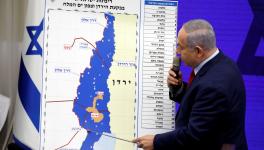Kashmir: Rulers Love for ‘Israeli Model’
It is difficult to believe that a serving Indian diplomat can dare speak in his official capacity, before a New York gathering of Kashmiri Pandits, tell them that Kashmiri culture “is Indian culture and it is Hindu culture”, and then espouse emulating the Israeli settlement policy as the “Israeli model”, which is notorious for its savagery. To characterise Kashmiri culture as entirely “Hindu” is not only to deny its overwhelmingly Muslim majority any role in their own culture, but is a means to justify driving away the Kashmiri Muslims from Kashmir. It is also difficult to believe that an IPS officer can peddle demographic transformation while serving in Kashmir.
These regressive ideas are difficult to believe—unless they reflect the Bharatiya Janata Party government’s policy on Kashmir. There are many in the bureaucracy who act as indoctrinated members of the ruling party. An Israeli diplomat in Mumbai had recently opined at a public meeting that Hindutva and Zionism are alike.
That Kashmiri Pandits must return to their homes and hearths in Kashmir is not in dispute. But to ride piggyback on Kashmiri Pandits to peddle abhorrent ideas shows how low the Indian establishment is willing to stoop to carry out its nightmarish vision.
The fascination for Israel’s apartheid policy in the context of Kashmir makes the abrogation of Articles 370 and 35A and turning the Jammu and Kashmir region into a Union Territory a way to push a settlement policy in Kashmir, by forcing the local population to move out. With the protection of their special status gone, the control and ownership of land in Kashmir now rests with the central government, as nearly all powers have been vested in the central government to do as it pleases with land ownership. Even the registration of immovable property now rests with the central government.
Asking a captive people to sell their land to the highest bidder is part of a public campaign by the government, which reminds of a veiled threat, “iron fist in velvet glove”. So the game plan of the government points towards following the same path as Israel, expelling original inhabitants and settling outsiders.
Let us see what imponderables lie in its wake.
Let us begin with the external world. In an interdependent world, India is not Israel. Unlike Israel, whether India likes it or not, Kashmir brings into the equation Pakistan for certain, and now also China. Furthermore, no matter what the Indian public are told, the fact is that while the world wants Pakistan to behave and contain the terrorists it has nurtured, they will not countenance any move by India which smacks of brinkmanship because that can spiral out of control. Particularly when India has now openly committed itself to making Pakistan “pay for Pulwama and Uri” and is prepared to go up the escalatory ladder of military response.
Neither of the two superpowers, US and China, nor Russia, the European Union and Japan, will allow Pakistan to be pinned to the wall. In the Afghanistan settlement, Pakistan is key to bring Taliban to the table, and it plays the role of an emissary between Iran and Saudi Arabia. Both are signs that it is much too important to be ignored. Neither in Afghanistan nor in Iran-Saudi mediation did India play any role. In addition, it is worth remembering that Pakistan is a party to the Kashmir dispute. Which means that it will be difficult for India to upscale military response at will.
Indians can claim that if Israel or other countries could bring about such demographic changes then why can India not do the same? The answer is because India is not Israel, which gets away with murder, so to say, because of support and patronage of the United States (US). Former diplomat MK Bhadrakumar has quite succinctly brought out the many difference between Israel and India.
In the US and European Union endorsement of the Israeli model, the public is reminded of what has been done to Palestinians by the Israeli state. Moreover, India’s worsening economic crisis, ‘tax terrorism’, dubious data and doctored statistics have made investors wary, both domestic as well as foreign. This is also a time when India is keen to compensate for the loss of face over not signing the Regional Comprehensive Economic Pact by pushing for a Free Trade Agreement with the US. This makes us more—and not less—vulnerable to domestic cross-currents in the US, where bi-partisan support for India has declined after the Indian Prime Minister publicly endorsed US President Donald Trump.
India’s foreign minister can split hairs to claim that the Indian PM did not endorse Trump, but he is as unconvincing as his government when it speaks of upholding constitutional morality a day after subverting it in Maharashtra.
In real life, what’s sauce for the goose is sauce for the gander does not always work. What counts is a country’s place in the pecking order, based on its internal strengths, which is what determines why some get away with genocidal policies while others do not. The Indian government is going to discover that it helped internationalise Kashmir by making a policy shift towards demographic change, which threatens to trigger a desperate struggle for self-preservation and an explosive situation between two nuclear-armed countries. And, as anyone knows, when the issue becomes one of self-preservation of Kashmiri people, then confrontation is inescapable.
As for the internal, it should be kept in mind that Kashmiris and Jammuites are proud owners of land as a result of radical land reforms which restored the peasantry’s rights over land—something that had been taken away from them under the feudal Jagirdari system of the Dogra Hindu rulers. Like elsewhere in India, where people have waged struggles for decades against land acquisition by government and private corporations, J&K has had its share of such struggles in the past. Not just in Kashmir, but even in Jammu, among the Hindu peasantry, there is a fear of losing their lands to outsiders. It is a secular emotion.
Most importantly, for three decades, India has waged a war of military suppression of Kashmiri people because they dared demand the right of self-determination. This desire could not be erased through counter-insurgency operations because when opportunities were created the political leadership was found wanting. Now, in the name of “change”, what is being brought in is an Israeli-style settlement policy.
While no actual land-grab has taken place since 5 August, the plans afoot suggest the way it is going to be carried out.
Question is, can it be carried out by India? Is it prepared to face a people who have been subjected to severe repression over three decades, which itself was preceded by 40 years of relatively peaceful struggle. If the threat of dispossession of their land is added to this mix, it amounts to inviting trouble upon oneself. A former cabinet minister in the Atal Bihari Vajpayee government recently said after a visit to Kashmir that there is no middle ground left there. This is true in more than one way.
When even the shell of autonomy does not exist anymore, an entire people, for more than 117 days, have been denied access to the internet, and left at the mercy of armed forces, which wield the power of life or death over them; when their intelligentsia has been silenced, arrested or threatened with arrest and all crimes inflicted on Kashmiris for three decades have been forgotten, then it leaves people with little choice. So, this is sure-shot method to trigger escalation of a conflict.
It sends a message across all the way to the northeast where the “mother of all insurgencies” led by the National Socialist Council of Nagalim (Isak-Muivah) or NSCN(IM) has not come to an end. The Indian government had to pull back from its ultimatum given to the NSCN(IM) to fall in line by 31 October, and give up on its demand for a separate flag and Constitution. If talks fail, a new phase of militancy flareup in the northeast is more than likely.
As a result, every regressive act done in Kashmir from now on will be watched closely by the North-Eastern states, which are already up in arms over the Citizenship Amendment Bill, the National Register of Citizens for the entire country, and their fear of being overwhelmed by outsiders.
Trouble is that it is a handful of people at the top who decide what happens. Few in the corridors of power have the courage to speak the truth. So one wonders when the government hides data, distorts and misrepresents the reality, and is surrounded by yea-sayers, that is such a government capable of thinking in our collective interest? When actual ground reality is so poorly understood, decision-making is going to reflect mediocrity and mendacity.
Instead of being informed by a sense of enlightened self-interest, it is an ideologically-driven agenda that we witness being unrolled, right before our eyes. Instead of learning from the disastrous history of Zionist settlement and its consequences, which have actually made Israel weak and insecure, India’s rulers appear to be going along with it. Yes Israel carries on with its settlements and occupation, but the day the US pulls back its hand from Israel, it will be in trouble, bereft as it is of friends, leaving itself open to too many enemies that it has created.
So Israel lives on borrowed time. If this is the path the Indian government wants to pursue, I fear the worst. The nature of confrontation will be very different from the one faced by the Palestinian people, who were left virtually to themselves to fight. This may not happen in the case of Kashmir being close to Afghanistan to remain unaffected by developments there, not to mention Pakistan above all. It will be much fiercer because it will bring religion into the volatile mix.
A government which is willing to blame the past or pretend that there is nothing wrong with the economy is as much a government which can deceive the Indian people about Kashmir and the situation there. Paradoxically, this once again makes it clear that the only call possible in such circumstances for the democratic-minded in India is a call to respect a freely-expressed democratic choice by the peoples of Jammu and Kashmir: a peaceful democratic way as a counter to Kashmir being turned into a colony.
The writer’s views are personal.
Get the latest reports & analysis with people's perspective on Protests, movements & deep analytical videos, discussions of the current affairs in your Telegram app. Subscribe to NewsClick's Telegram channel & get Real-Time updates on stories, as they get published on our website.
























